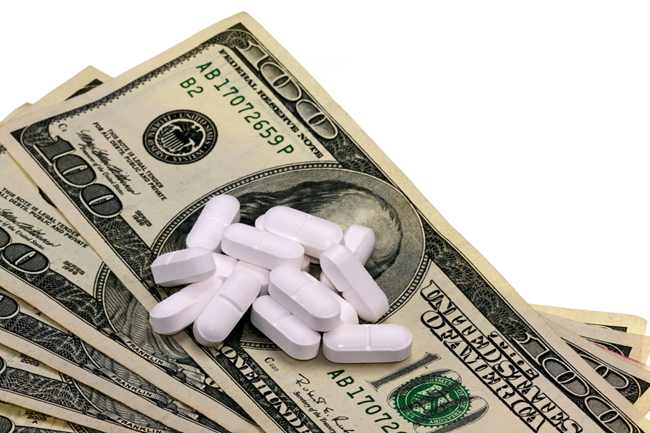The book (and movie) The Big Short got me thinking: What will be the next bubble to pop? I am certainly not a financial expert, and I have no idea what is involved in stocks or bonds, but I would venture to guess that at some point in the near future the healthcare system, and the pharmaceutical companies in particular, are going to crash.
The 21st Century Cures Act
As is pointed out in The Big Short, all people and institutions respond to incentives. The 21st Century Cures Act, which is passing through Congress right now, incentivizes pharmaceutical companies to produce ineffective drugs that are no better than snake-oils.
The 21st Century Cures Act will allow drug approvals to be based on biomarkers and surrogate measures rather than health outcomes. This means that drugs will not need to be shown to treat effectively or cure diseases or even symptoms—rather, they will only need to demonstrate that they change a particular biomarker.
A New England Journal of Medicine (NEJM) article, “The 21st Century Cures Act — Will It Take Us Back in Time?” notes that:
..though a drug’s effect on a biomarker can make approval quicker and less costly, especially if the comparator is placebo, it may not always predict the drug’s capacity to improve patient outcomes.
If a drug doesn’t need to improve patient outcomes, how, exactly, is it effective? And how is it any better than snake-oil?
All pharmaceuticals come with side-effects and risks. The 21st Century Cures Act’s encouragement of drugs to be approved based on biomarkers rather than patient outcomes will enable pharmaceutical companies to produce and market drugs that have risks but no benefits.
A current example of biomarkers being used instead of health outcomes that is currently working out poorly is the HPV vaccine, which hasn’t changed cervical cancer rates at all, while leading to debilitating adverse-effects for thousands of people (mainly young women).
Additionally, the 21st Century Cure act “could substantially lower the standards for approval of many medical products, potentially placing patients at unnecessary risk of injury or death.” (New York Times, “Don’t Weaken the F.D.A.’s Drug Approval Process”). The Act will decrease the standards that must be met for clinical testing, and will rush new drugs, especially antibiotics, to the market without conventional clinical trials.
I suspect that the 21st Century Cures Act will initially inflate the healthcare system and its stocks—after all, it will remove many of the regulatory barriers that keep drugs from being rushed to market. However, when people realize that they are being hurt by ineffective, dangerous drugs, they will lose faith in the medical system as a whole, and eventually the system will collapse. Confidence in the safety and efficacy of pharmaceuticals is necessary for people to continue to consume them. The pharmaceutical industry is foregoing their credibility in exchange for short-term gains. They do so at their own risk.
Inept Regulatory Agencies
Just as the ineptitude of Moody’s, Standard and Poor’s and other rating and regulatory agencies contributed to the collapse of the housing market, the failure of the FDA to properly regulate pharmaceuticals is likely (in my opinion) to contribute to a collapse in the healthcare market.
The FDA is not adequately regulating drugs to protect the public. More than 124,800 people die each year because of direct adverse drug reactions and medical mistakes—and that’s not even counting those who die indirectly from adverse drug reactions that lead to chronic illness. This situation is unacceptable, and it shows that the FDA is not doing its job of protecting the public from dangerous drugs.
Pharmaceutical companies with large amounts of money, power and lobbying influence, are writing the rules of the game, and neither the FDA nor anyone else is stopping them from putting dangerous drugs onto the market. Any system that lacks checks and balances will eventually destroy itself—the medical system is no exception.
In The Big Short it is noted that, “His (Steve Eisman’s) experience with household finance had disabused him of any hope that the government would intercede to prevent rich corporations from doing bad things to poor people.” I suggest that the American people likewise disabuse themselves of the notion that the FDA is protecting patients from pharmaceutical corporation malfeasance. Dangerous drugs are killing and maiming millions of people, and the FDA—a large branch of the American government, is doing nothing to fix the situation.
Complicated Instruments
The housing market crash was due, in part, to the fact that CDOs and other financial instruments, were so complicated, and so poorly understood, that few people (and certainly not those in the regulatory agencies) realized that they were enabling malfeasance, foolishness, and fraud.
Likewise, pharmaceuticals are so complicated that few people, and certainly not those at the FDA, know how they work. For example, it is well-known that fluoroquinolone antibiotics (Cipro/ciprofloxacin, Levaquin/levofloxacin, Avelox/moxifloxacin and Floxin/ofloxacin) damage tendons and other connective tissues (there is a black box warning on all fluoroquinolones noting that they have this adverse effect). However, it is not known HOW fluoroquinolones damage tendons and other connective tissues, or what factors put an individual at risk for experiencing tendon ruptures after exposure to fluoroquinolones. Additionally, the delayed adverse-effects and the tolerance thresholds for fluoroquinolones are not understood at all—by anybody. There are a lot of very smart biochemists in the world who try to understand drugs, but even (maybe especially) they understand that the complex feedback and feed-forward loops in our biochemistry are poorly understood. Our biochemistry is so complex that consequences of disrupting one system, or one interaction, are unknown.
Most people assume that someone understands how drugs work. Understanding is necessary for proper regulation and most people assume that the FDA knows how each drug works well enough to properly regulate them. This is a false assumption, and when people realize that their assumptions about the FDA understanding the consequences of the drugs they are supposed to regulate don’t hold, they will lose faith in the medical system.
Loss of Credibility
When people are hurt by the medical system, they tend to opt out of it entirely. There are certainly some exceptions to that statement, but if you look at patient groups for people who have been hurt by medical devices (like Essure), psychiatric drugs (like benzodiazepines), other pharmaceuticals (like fluoroquinolones), or vaccines (like Gardasil), you will find people who are highly suspicious of the medical system as a whole. They opt out of the system and avoid consuming pharmaceuticals entirely after they have been hurt by a medical device, pharmaceutical, or vaccine. Most of them trusted the medical system before they were hurt by it, but after being grievously injured by a medical device or pharmaceutical, they no longer trust the medical system and opt out of using it whenever possible.
For people to trust the medical system and for it to maintain credibility, medicine must truly be evidence-based science. If it is not based in science, it is no better than the snake-oils of the past. If it is no better than snake-oils, will people trust it as much as they currently trust snake-oils?
When enough people are hurt by the medical system, and enough people opt out of it, it will collapse. I have no idea when that will happen, or even if it will happen. I believe that the 21st Century Cures Act will increase the likelihood of a healthcare system collapse, and that a medical system that seeks profits over health for the American (or any other nation) public, is not sustainable.
I suspect that, at some point in the future, people will look back at the medical system of the early 21st century and think that we were all fools for letting the pharmaceutical companies hurt and kill so many people. People will look back at this time and wonder why we trusted profit-motivated corporations with chemical concoctions that can permanently damage our cells, and even our DNA.
We trusted the pharmaceutical companies based on faith in the system. We had faith that medicine was evidence-based. We had faith that the regulatory agencies were protecting us. We had faith that proper tests were being done. We had faith in the notion that side-effects were “rare.” But when people get hurt, and they become one of the “rare” people injured by pharmaceutical company greed, their perspective changes—and many people lose faith in the system entirely. If enough people lose faith in the system, and if the system destroys its credibility, it will collapse.
We saw the collapse of the subprime housing market in 2008 and The Big Short explained the collapse in easy-to-understand terms. A similar stage is being set in the healthcare industry—with legislation that abolishes safety standards, incompetent regulatory agencies, and complexity that is mind-boggling. Just as people woke up to the fact that subprime mortgage bonds were not worth anything, eventually they will wake up to the fact that there are too many drugs that are doing more harm than good—and once the medical system loses credibility, it will crash. This anticipated crash can be prevented, but I don’t see any systemic movement toward that. We shall see.
Information About Fluoroquinolone Toxicity
Information about the author, and adverse reactions to fluoroquinolone antibiotics (Cipro/ciprofloxacin, Levaquin/levofloxacin, Avelox/moxifloxacin and Floxin/ofloxacin) can be found on www.floxiehope.com.
We Need Your Help
More people than ever are reading Hormones Matter, a testament to the need for independent voices in health and medicine. We are not funded and accept limited advertising. Unlike many health sites, we don’t force you to purchase a subscription. We believe health information should be open to all. If you read Hormones Matter, like it, please help support it. Contribute now.













